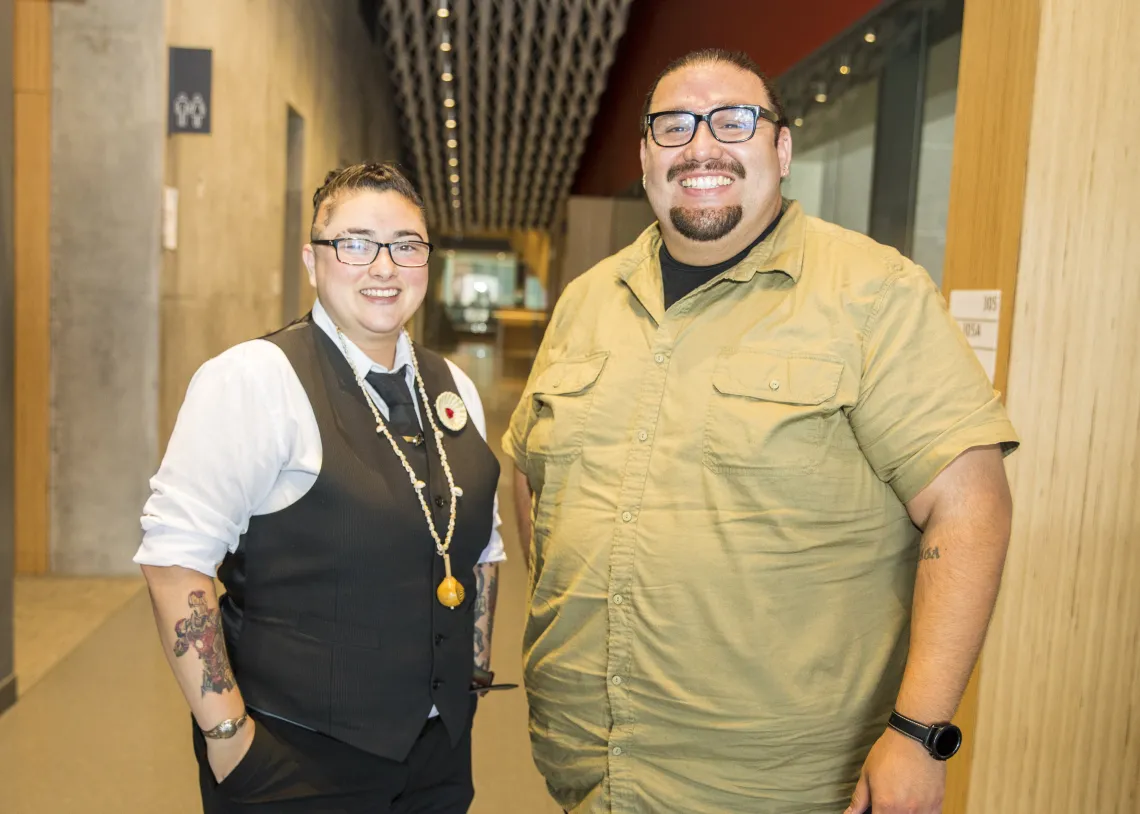Provost Funding Bolsters Reach of 'A Students Journey'
A collaborative partnership between the Southwest Environmental Health Sciences Center (SWEHSC) and Tohono O’odham Community College addressing low transfer rates of students from Tribal colleges and universities (TCU), has received a funding boost to exp

IRes Program Manager, Daniel Sestiaga Jr. and Anaysa Stark
A Student’s Journey, a year-long program for Native American students enrolled at Tohono O’odham Community College and San Carlos Apache College, was awarded nearly $200,000 by the University of Arizona Office of the Provost through the Provost’s Investment Fund initiative.
Benjamin Richmond, associate director of the Community Engagement Core (CEC) within SWEHSC, helps lead the program as part of his role to promote environmental health literacy.
“The Provost Investment Fund is being used to expand the number of students we can reach, increase the number of Tribal Colleges we collaborate with, and collect data that will be used to seek more sustainable funding,” Richmond said. “We hope to not only expand the program but develop a model that can be replicated in other institutions.”
Out of the 11 students who participated in the program last year, one has graduated, three have already transferred and seven have plans to transfer to the University of Arizona or another four-year institution.
The goal is to have 20 to 25 students each year and expand to more TCUs in the future, he said.
For 2022, 10 students were selected to start the program in February. During the spring, they attended monthly workshops focused on environmental health, social justice, and transitioning to college. The students also delved into what internships they want to pursue for the summer.
“Students are paired with faculty and staff mentors who are closely related to their career interests whether that is health, science, business, art, education, law or any other field,” said Alex Benavides, a program coordinator for A Student’s Journey. “Students are then challenged to discover how those interests align with an environmental health lens.”
Daniel Sestiaga, program manager at the Indigenous Resilience Center within the Arizona Institute for Resilient Environments and Societies, said no matter what career path a student chooses to take, every sector of the industry faces environmental challenges – especially if they live within a Tribal community.
Sestiaga and Richmond collaborate to provide culturally relevant knowledge and to ensure students develop a sense of belonging.
The summer internship begins in July and pairs each student with a faculty or staff member. Students live in the dorms on campus and receive stipends. Every Friday, students attend a daylong seminar to earn their three-credit hours for the internship.
At the end of the five weeks, students share the lessons they learned, the campus resources they found most useful, and what they worked on during a student showcase.
Anaysa Stark is a tattoo and graphic artist who was paired with Sestiaga.
Working with Sestiaga, Stark helped create logos, letterhead templates and other creative assets to help give the Indigenous Resilience Center a more distinct look and feel.
“To be asked to create a logo to represent all 22 Federally recognized Tribes as a non-traditional, first generation and non-degree holding college student was the most rewarding and humbling experience during my internship,” Stark said.
The experience gave Stark the confidence to see a college as attainable and is looking forward to enrolling at the University of Arizona after community college.
“I will use all of what I learned during my internship to open an Indigenous and 2SLGBTQ+ Art and Sporting Center here on O'odham Land,” Stark said. “This program really sheds light on how I can help my community by way of art therapy, prevention work and finding paths around systemic barriers to better the life, health and education of our community.”
After the summer internship, students return home to a Fall Practicum within their home community and work with Annamarie Stevens, the transition coordinator for Tohono O’odham Community College.
“It is important to create an opportunity for students to learn about organizations in their communities and learn from someone in their career interest to help guide them into the workforce,” Stevens said. “The entire experience is to help them develop a deeper understanding of their communities' needs and how they can give back and expand their knowledge.”
Applications for the 2023 cohort open Fall 2022. For more information about A Student’s Journey, visit the Southwest Environmental Health Sciences Center website.
https://www.pharmacy.arizona.edu/news/2022/provost-funding-bolsters-rea…
